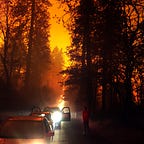Climate Disaster Preparation Guide
--
Climate change is here, and it’s coming for you and your home. Oh, maybe not today or this year, but it is coming.
After nearly a year of writing about climate change and collapse here on Medium, I’ve put together kind of a semi-coherent guide to preparing for and dealing with some aspects of that.
This is in no way an exhaustive guide on how to prepare for and deal with a climate disaster. Not even close, so I don’t need to be reminded about all the things I’ve left out. I’m aware.
And if you’re looking for a “prepper” guide, this isn’t it. Just google “prepping” to learn how to stockpile protein powder and ammo.
But hopefully you will find this useful in some way. Much of it is based on my personal experience.
1. What’s Coming Can’t Be Stopped
Let’s start at the very beginning and address the difference you can make in “stopping” climate change and climate disasters.
You can’t. You can’t make a difference. You are too small to “save the planet”, no matter what you do or don’t do. It’s just a fact. I’ve done the math:
2. Acceptance
OK, so then what? Once you realize that there is no stopping what’s coming, what’s the next step? Acceptance of our predicament is difficult. For me, acceptance has meant cultivating the 4 C’s: calm, community, connections, and capacity:
3. Know Your Risks
Other than working on acceptance, what else can you do to prepare? The first thing you should do is evaluate the climate risks where you live. What are the likelihood of floods, tornadoes, wildfires, etc.?
It needs to be stressed that nowhere is safe from climate change or climate-driven disasters, and that moving to a “low” risk area in no way guarantees safety, but some places definitely have more risk than others:
4. Understand the System
If you are struck by a climate disaster, you’re going to be dealing with “the system”. A lot.
I know. I’m still dealing with the system five plus years later.
What is “the system”? It’s FEMA. It’s banks. It’s insurance companies. It’s lawyers. It’s realtors and landlords. It’s the IRS. It’s relief agencies. After a climate disaster, it’s basically everything for the next several years of your life.
And the first thing you need to know about “the system” is that it is not here to help you:
The second thing you need to know is that climate disasters impact vulnerable communities (the elderly, the poor, people of color) disproportionately:
And that “the system” is designed to favor the wealthy, the white, and the educated:
And the last thing you need to know is that “the system” is beginning to break down:
5. Prepare
None of that is good news. And there is very little you can do you prepare for that in the long run. In the long run — as my father used to say — we’re all dead.
However, there are a few things you can do to increase your chances of recovering from a climate-driven disaster.
First of all, you need to be ready — as ready as you can be — to lose your home:
And secondly, you should evaluate how well positioned you are to navigate “the system” and “recover” from a climate disaster:
I could write a dozen more articles about preparing for what’s coming — and probably will — but hopefully these articles give you a bit of a head start in being as ready as you can.
